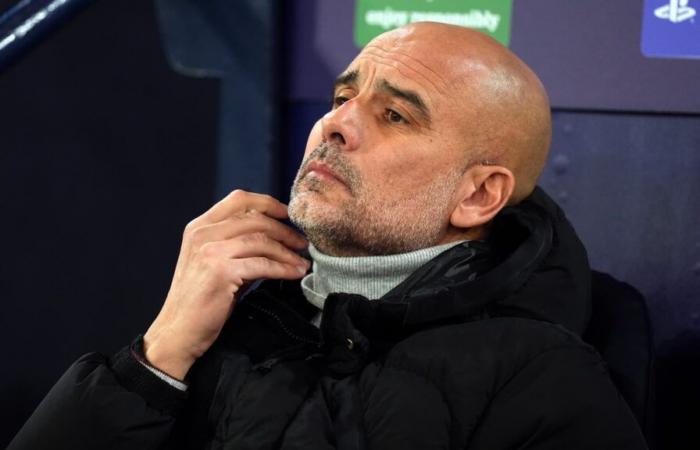Pep Guardiola appeared with his face marked by his own scratches after Manchester City's draw against Feyenoord (3-3) this Tuesday in the Champions League. Behind these images that have gone viral lies a truly dangerous phenomenon for high-level athletes: self-mutilation. RMC Sport looks at this physical suffering born from psychological distress and sometimes with very dangerous consequences.
His forehead reddened, his nose scratched… Questioned a few minutes after the draw conceded by Manchester City against Feyenoord (3-3) during the fifth day of the Champions League, Pep Guardiola visibly blames the blow. Despite three goals ahead at the start of the last quarter of an hour, the Skyblues were caught and went on to a sixth match without a victory in all competitions. Beyond the failure of his team, it is the face of the Catalan coach, covered in scratches, which especially stands out.
“I did this to myself with my finger, with my nail,” the technician tries to justify at a press conference by miming cutting himself. Before concluding his intervention with a little laugh: “I wanted to hurt myself.”
“Scratches, athletes who will tear their skin, who will hit themselves”
After this response considered too light on the scourge of mental health that is self-mutilation, Pep Guardiola published a press release this Wednesday to recall the dangers of such a practice. But the Manchester City coach is perhaps also the victim, as psychologist Johanna Rozenblum explains to RMC Sport.
“Self-harm has always existed in high-level sport. I believe we are talking about it today because we are only now realizing that high-level sport has consequences on physical health – that we already knew this – but also on mental health”, analyzes the practitioner. In the world of sport, where the body is generally the number 1 working tool, the sideways generally take very precise forms.
“It’s going to be scratches, athletes who are going to tear their skin, who are going to hit themselves,” she lists.
A situation that seems to apply well to Pep Guardiola. And the BFMTV health consultant clarified: “In young women, it will also be trichotillomania, that is to say hair pulling. This could be food deprivation and therefore a disorder of the generally anorexic eating behavior to achieve an expected figure, particularly among high-level athletes in gymnastics.”
A “hate” linked to hatred of failure or loss of control
Crackling for some, simple annoyance for other Internet users, the behavior and especially the signs of self-mutilation can be of concern at a time when certain athletes are allowing themselves to open up about their mental and psychological distress. And if Pep Guardiola seemed to smile about it, it is rarely a bloodbath according to Johanna Rozenblum.
“I think that we should not minimize things. When we harm our own body or our own physical integrity, it is because the psychological suffering is there. It is rarely impulsive behavior”¸ continues the clinical psychologist. “In general, it is really a hatred that arises either because there is an inability or difficulty to tolerate failure or to tolerate the loss of control, the fact of not completely mastering a situation or a competition. “
“And then finally, a loss of pleasure. Competition, sometimes, does that. High-level sport does that. Sometimes the expectations are such that the pleasure is no longer there. And the physical suffering comes paradoxically, either to punish by inflicting additional suffering on oneself, or to alleviate suffering by diverting attention from psychological suffering with physical suffering.”
The physical integrity of athletes in danger
But sometimes self-harm takes even more violent forms. On the sidelines of his elimination in the second round of the Masters 1000 in Paris at the end of October, Russian tennis player Andrey Rublev also showed signs of nervousness and even ended up bleeding after violently hitting his knee with his racket. A behavior which reflects this desire to relieve pressure during a sporting confrontation or after a poor performance.
Here again, Johanna Rozenblum sees the signs of great psychological suffering from which the athlete seems to see no other way than violence against himself.
“Self-mutilation is psychological suffering which harms physical integrity,” insists the author of several psychology works, particularly on hypersensitivity or narcissistic perverts. “[…] We ultimately have competitors and athletes who can no longer exercise or do their sport because the body, at one point, is too affected, can no longer move forward and no longer has the capacity to progress. So it’s really a punishment on all levels. […] the consequences are dramatic and they denote undeniable psychological suffering beyond the bloodshed or impulsivity.”
Self-harm has “absolutely nothing beneficial”
Without going to the extreme of Andrey Rublev, images of Pep Guardiola's face have gone viral. But in his smiling reaction on the subject, perhaps simply on the surface, the Catalan coach was also able to maintain this somewhat masochistic character of the high-level athlete, or in this specific case of the manager in sport.
“Many athletes will say that deep down, you have to be a bit of a masochist to do this job. Because it involves workloads and then a quantity of physical effort… And above all, it's all about repetition “, explained Cédric Quignon-Fleuret, sports psychologist, at the end of July during his appearance on the show After Foot on RMC. “There is a large part of the work which is obscure, such as physical preparation or tactical preparation. It all depends on the definition we take of masochism. At the high level, there is something which will be of order to manage to tolerate things that are unpleasant to us because we see their usefulness a posteriori.”
Self-mutilation goes even further than this simple masochism and Johanna Rozenblum sees no advantage in it for the athlete. Quite the contrary, since it comes down to a diversion strategy.
“There is no benefit to self-mutilation, we must be very clear with that. Self-mutilation allows us to divert attention,” continues the BFMTV health consultant.
“When you have such psychological suffering, an inability to manage this suffering. It can be anger, sadness, distress, guilt… Physical suffering takes over, it distracts attention. of your psychological suffering. The more your body suffers, the less you think about what your mind is telling you. That's what self-harm is for, so it has absolutely nothing beneficial.
Boosting, a practice of self-harm at the Paralympic Games
During the recent Paralympic Games in Paris, self-mutilation was even a means of increasing sporting performance among certain athletes adept at boosting. Among athletes suffering from paralysis linked to damage to the spinal cord, self-mutilation may have enabled some to outperform.
Without feeling the pain given a failing nervous system, these para athletes were thus able to benefit from an increase in heart rate and better blood oxygenation via autonomous muscular contractions of the body, while inflicting injuries on themselves. bodily.
“Self-mutilation leaves stigma”
Johanna Rozenblum does not forget to distinguish between this self-mutilation that high-level athletes and sports players can inflict on themselves with certain processes to activate the body or the mind. Thus, the psychologist sees a sort of “continuum” when swimmers hit their body before a race to activate their body and “give a form of impulse or stimulate their adrenaline and endorphin” before an intense effort. In the same way, rugby players who can sometimes be seen slapping themselves before a match to motivate themselves or find a sort of fighting spirit.
“Self-mutilation leaves stigma, it leaves suffering,” complains the clinical psychologist at RMC Sport. “[…] Psychologists who work on self-harm know these reflexes well. Because it's not just beatings. It is also associated with psychological suffering, denigration, and an ability to manage frustration or anger. It's a whole cluster of symptoms that helps draw our attention to potential self-harm.”
A need to better detect and treat self-harm and mental suffering
Faced with certain phenomena of mental and psychological distress, certain clubs now call on specialists to monitor players and coaches. Guest of the show Generation After on RMC at the beginning of November, Luka Elsner welcomed the integration into the Reims staff of a sports psychologist to support the group.
“Sometimes, it is purely in the area of performance, because it can greatly help with concentration and the ability to set goals,” explained the Champagne coach during his intervention. “But also simply being an interlocutor to discuss things that are a little more vague, state of mind and emotional state which are strongly disturbed by performances. In any case, more by results than by performances.”
If this process develops, Johanna Rozenblum believes that it must be pushed even further. And for good reason, according to her, “we find ourselves with athletes who start doing sport at a very early age, often in adolescence, and who do not know how to deal with failure or who think that they are not loved. only by their success.
The psychologist even notes that these young athletes can feel “immense disenchantment” in the event of poor performance. A phenomenon to which is sometimes added a form of guilt regarding the investment of their loved one and to which social networks sometimes add mockery, comments or even insults. As the pressure becomes more and more difficult to manage and internalize, the athlete will choose self-harm.
“When we are able to turn the blows against ourselves, it is because the suffering has already been present for several months or even several years. We therefore already need an awareness of the teams surrounding these athletes or of the family to understand that practicing sport at a high level, even successfully, is not synonymous with well-being and happiness. We may also need to bring in more healthcare personnel to identify the weak signals of psychological suffering. could ultimately lead to self-harm. she advises.
Jean-Guy Lebreton Journalist RMC Sport






